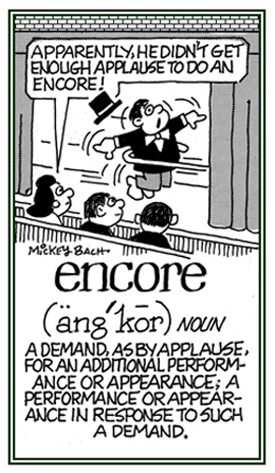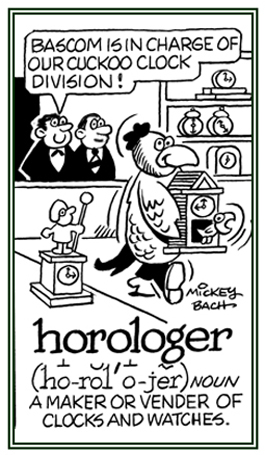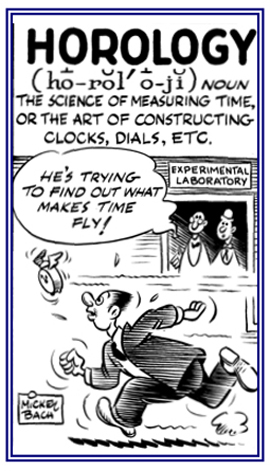horo-, hour-
(Greek > Latin: hour, time; period of time, season, any limited time)
bihourly (adjecrive) (not comparable)
Regarding something taking place every two hours: Dr. Smart told Jane that she should take her medicine bihourly, except during the night, and for three days in a row in order to cure her ailment.
1. A demand by an audience, as by applause, for an extra performance of a song, act, etc.: The presentation by the cellist was so fantastic when he played Bach’s Sonatas, that the listeners insisted on an encore and so the musician played an additional piece which was not on the program!
2. Etymology: used in the sense "again" from French, "again, still, yet"; said to be possibly from Latin hanc ad horam, "to this hour".

© ALL rights are reserved.
Go to this Word A Day Revisited Index
2. Etymology: used in the sense "again" from French, "again, still, yet"; said to be possibly from Latin hanc ad horam, "to this hour".

Go to this Word A Day Revisited Index
so you can see more of Mickey Bach's cartoons.
The discipline or art of creating timekeeping devices: Jacks's father was a kind of artist in the area of horography who designed and constructed watches, clocks, and other timepieces.
An outdated term for any device used to tell the time: Little Ivy didn't know what her great-grandfather was talking about when he said horologe , but he explained that it was an old-fashioned word for watch or clock.
A person who repairs, makes, and/or sells watches and clocks: Jim wanted to become a horologer, or horologist, who was an expert in dealing with timepieces, so he had to study horology.

© ALL rights are reserved.
Go to this Word A Day Revisited Index

Go to this Word A Day Revisited Index
so you can see more of Mickey Bach's cartoons.
horologic (adjective) (not comparable)
Referring to timekeeping devices or to the study of the assessment of time; hocrological: Joe was fascinated by the mechanism of geared wheels inside old clocks and wanted to learn more about the horologic mechanics in clocks and watches.
1. A description of horologes or timepieces: Mary bought a book on horologiography to read about old clocks, like the grandfather clock she inherited.
2. The art of constructing horologes: To work in the discipline of horologiography in creating fine and delicate timepieces was Mary's main aspiration and desire.
2. The art of constructing horologes: To work in the discipline of horologiography in creating fine and delicate timepieces was Mary's main aspiration and desire.
Someone who studies the science of measuring time: Not only did Tom take courses about how clocks worked, but he also became an excellent horologist and was very skilled in making clocks, watches, and even sundials.
1. The scientific subject area of how time is measured: Because Timothy was very interested in old watches, and had a collection of them, he bought a book on horology to find out more about years, months, days, hours, minutes, etc.
2. The art of making timekeeping instruments, such as clocks and sundials: Since she was a little girl, Tina was fascinated by old pocket watches and so she decided to study horology and learn more about how time could be determined.

© ALL rights are reserved.
Go to this Word A Day Revisited Index
2. The art of making timekeeping instruments, such as clocks and sundials: Since she was a little girl, Tina was fascinated by old pocket watches and so she decided to study horology and learn more about how time could be determined.

Go to this Word A Day Revisited Index
so you can see more of Mickey Bach's cartoons.
An device for assessing time: Grace's hobby was collecting all kinds of horometers, especially very old ones that had to be wound up about two times a week!
The art of the measurement of time: Jerry had to learn more about horometry in order to determine the exact errors of timepieces by observation so that he could repair old watches.
1. The aspect of the planets and stars at a given moment, as the moment of a person's birth, used in astrology: A horoscope is an astrologer's description of an individual's personality and future based on the position of the planets in relation to the sign of the zodiac under which the person was born.
2. A diagram of the heavens showing the relative position of planets and the signs of the zodiac, for use in calculating births, foretelling events in a person's life, etc.: A horoscope can be a prediction of future events or advice for future behavior based on the diagram described in the previous definition.
2. A diagram of the heavens showing the relative position of planets and the signs of the zodiac, for use in calculating births, foretelling events in a person's life, etc.: A horoscope can be a prediction of future events or advice for future behavior based on the diagram described in the previous definition.
The making and interpretation of horoscopes: Jill'S aunt was very good horoscopy by casting, understanding, and explaining predictions of events that would happen in one's future.
horotelic (adjective) (not comparable)
Of or pertaining to evolution at a rate standard for a given group of plants or animals: Professor Miller told his students about the horotelic developments and natural selection of the animals and plants in their country.
1. One of the 24 equal parts of a day: It took Janet only one hour to do her homework for school for the next day.
2. One of the points on a timepiece marking off in 12 or 24 successive intervals of 60 minutes, from midnight to noon and noon to midnight or from midnight to midnight: The clock stuck two times when it reached the hour or number 2 on the face of the clock.
3. The time of day as indicated by a 12-hour clock and the time of day determined on a 24-hour basis: 1730 hours is 5:30 p.m.
4. A time emphasised to mean that something lasts or takes a long time (only pl): It took hours and hours to get to L.A. because of so many construction sites on the freeway.
5. A customary or fixed time: The hour for dinner time at the Smith's home was at 6 o'clock in the evening.
6. Etymology: from Old French hore, "one-twelfth of a day" (sunrise to sunset), from Latin hora, "hour, time, season"; from Greek hora. "any limited time"; referring to a day, hour, season, and year.
2. One of the points on a timepiece marking off in 12 or 24 successive intervals of 60 minutes, from midnight to noon and noon to midnight or from midnight to midnight: The clock stuck two times when it reached the hour or number 2 on the face of the clock.
3. The time of day as indicated by a 12-hour clock and the time of day determined on a 24-hour basis: 1730 hours is 5:30 p.m.
4. A time emphasised to mean that something lasts or takes a long time (only pl): It took hours and hours to get to L.A. because of so many construction sites on the freeway.
5. A customary or fixed time: The hour for dinner time at the Smith's home was at 6 o'clock in the evening.
6. Etymology: from Old French hore, "one-twelfth of a day" (sunrise to sunset), from Latin hora, "hour, time, season"; from Greek hora. "any limited time"; referring to a day, hour, season, and year.
The Greeks borrowed the notion of dividing the day into hours from the Babylonians, but the Babylonian hour was one-twelfth of the whole day and therefore twice as long as a modern hour. The Greeks divided only the period of light into 12 parts, and the Romans adopted the system from them.
Night was not similarly divided until much later, and so the period of time covered by an hour varied according to the season.
In the 16th century, a distinction was sometimes made between temporary (unequal) hours and sidereal (equal) ones.
Related "time" units: aevum, evum; archaeo-, archeo-; Calendars; chrono-; pre-; Quotes: Time; tempo-.
Showing page 1 out of 2 pages of 18 main-word entries or main-word-entry groups.

